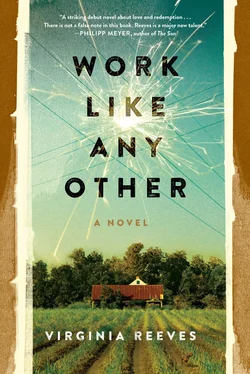Our librarian is a twig of a man named Ryan Rash. With a note of great accomplishment in his voice, he tells me that he’s gotten me a standing Friday shift in the library. “Your foreman at the dairy isn’t willing to let you go for more than a day a week, but it’s something. And don’t go thinking I’m doing you a favor, now. I need some kind of literary talk on occasion, and you’re one of the only damn men who reads in this whole place, so it makes sense. The boys I have in here the rest of the week can barely keep the numbers straight.”
Because compliments are so hard to get, I take Rash’s words as one.
The Fridays are welcome, the library always dark and cool, something deep and musty about the place. The collection is small, but it takes time to sort and shelve. I enjoy wheeling Rash’s creaky cart down the narrow aisles, stopping here and then there, slipping a book into its slot. The organization is comforting, a great structure that can catalog and number everything.
I prefer the numbers in Dewey’s system to Rash’s alphabetical sorting in the fiction. Dewey put literature in the 800s, but library folks like to give it a spot of its own, let the customers find their favorites by name. As though convicts have favorites. Taking the fiction away from the numbers breaks the rules of classification, and it bothers me like misplaced pails and caps in the barn. Any misplacement throws off the whole system, and the 800s are too small without their novels.
The use of electricity is in the 600s, applied science. Religion is in the 200s. If there were any books on the death penalty, they’d be in the 300s — social sciences — but we don’t have any of those. Rash has a copy of the Manual for Institutional Libraries that warns prison librarians to ensure that their collections are “censored carefully. Nothing should be accepted which represents vice attractively, contains sensual suggestions, or deals with crime and punishment.”
Rash finds the manual humorous and gave me that specific section to read. “Doesn’t leave us with much, does it?”
“You have Crime and Punishment on the shelf.”
Rash nodded. “I’d hoped the title might compel some of our men to actually read it.” He showed me its card — checked out four times, returned a day later every time. “You’ve read it?”
“Yes.”
“Why?”
“My wife’s father had a large library in his home. The title caught my attention.”
Rash laughs at this. “Ah! You see? That’s why I need you around here.” Rash is the only member of the prison staff who offers appreciation, and I believe it comes from his work. He’s a trained librarian, and though he could’ve worked in any other library, he’s told me he chose to work at Kilby. He believes in the prison’s promise of rehabilitation, and he wants to be a part of it. At times I feel compelled to ask what the milk I occasionally steal for him is doing to rehabilitate me, but Rash is so good a man compared to his peers.
Our library has seven books on dairy farming—600s. Cotton is in there, too. All the agriculture. It’s strange to me that electricity gets filed under the same number. Dewey must’ve seen the running of power through wires as the same as running shoots out of the ground, seeing them all as applications of science. If Rash can stand for electricity and agriculture to be lumped together under one number, there’s no reason he can’t let the fiction lie alongside the poetry.
I still miss the library in Marie’s house, dark with its wood and heavy curtains. “Light breaks down the paper and the bindings,” Marie told me the first time I came. “We keep the curtains drawn during the hours of high sun.”
Marie’s father was a farmer — yes, always — but he was also a reader. These were his two occupations, he told me.
“Are you a reader, son?” he asked early.
“Yes, sir.”
“That’s good. A heap of books is the only foundation a man needs.”
Had my father lived to meet the man or chosen to meet the man given the chance, he would not have been impressed. “A solid occupation is the only foundation a man needs,” I hear him saying. “It’s those damn books that did you in.”
Marie’s father would be pleased with the section on fiction in Rash’s manual, though. The last paragraph reads, “Let the prison library not only meet the recognized needs of the men, but inspire them in further efforts. The reading habit once firmly fixed is among the best safeguards for any man.”
Rash appreciates this passage in the manual, too, and he uses it with the board to bolster his collection of fiction. To me, the passage isn’t about fiction, though, but rather any book, regardless of its type. I want books full of information as well as stories, and I see this in the men around me, too. Roberts wants art books. Powers wants biographies on Alabama governors. The illiterate fellows want books full of etchings and photos. Somehow, there’s a book in here about Yellowstone National Park. It’s popular, all those hot bogs and steam vents. Maybe we just want to know the real pieces of the world now that we’re so far from them.
Ed is always looking for books about ships. Rash has built up the maritime section solely for him.
“Why won’t he read Moby-Dick ?” Rash asks me. “He rotates through the same seven books, and every eighth request, I slide it in there. Comes back in a day, just like Crime and Punishment .”
I don’t offer Rash a reason. He must already know that Ed isn’t interested in literature. Hearing that truth aloud won’t make Rash stop trying.
I hear footsteps, boots on the hard floor. It’s Dean. He’s in on the murder of his daughter’s suitor, though some say it was more than that — a business dealing gone sour. Chaplain’s teaching him to read.
“You got this?” he asks, setting a paper on top of the books on the cart. “Chaplain says the library’s got it.”
I recognize Chaplain’s handwriting. It’s dainty, neat as a lady’s, and it reminds me a bit of Marie’s. They make their M ’s the same, and their T ’s. He’s written The Old Tobacco Shop , by William Bowen. It’s a children’s book, and I remember snatches of it, Marie reading it aloud to Gerald when it first came out. I can hear her voice.
“You got it?” Dean’s asking.
“Yes.” I lead him to the 800s. Rash stocks quite a few books for children, and he allows them to stay in among the few volumes of poetry we have.
I pull The Old Tobacco Shop from the shelf. Its cover is green, the corners rubbed tan. Dean flips a few pages. He stops at the first illustration. “What’s this say, Roscoe?”
“ ‘Lord bless us!’ cried the hunchback. ‘Look at that!’ ”
“There’s a hunchback in it?”
“Yes.”
He nods and tucks it under his arm as though a hunchback were all he needed. Dean appreciates the Bible stories that deal with peculiarities and deformities. He’s come up to me after services, his Bible in front of him: “Read me that bit, Roscoe, about those creatures with the four faces each.”
And so I read the passage for him.
“How can they not turn when they go?” Dean asked.
“I don’t know. You’ll have to ask Chaplain.”
That story was all Chaplain needed to convince Dean to start studying his letters, and now Dean is reading The Old Tobacco Shop . A copy of it is sitting in the farmhouse, on one of the many bookshelves in that dark library. I can see Gerald asking Marie to read it again. He has not outgrown it, because — in my mind — he has not grown.
I fear we don’t grow, either, here in these walls. Instead, we go backward. So many of the men around me are boys, taken again with legends. All of us imagine new creatures in the dark of our cells. Four-headed beasts with calf hooves from our own new Guernseys, down in their fields.
Читать дальше












